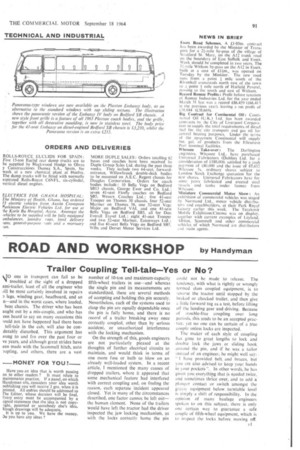ROAD AND WORKSHOP by Handyman
Page 93

If you've noticed an error in this article please click here to report it so we can fix it.
Trailer Coupling Tell-tale—Yes or No?
CO one in transport can fail to be I troubled at the sight of a dropped emi-trailer, least of all the engineer who till be most certainly involved in repairs 3 legs, winding gear, headboard, and so n—and in the worst cases, where loaded, bent chassis. The driver who has been aught out by a mis-couple, and who has een heard to say on many occasions this mould not have happened had there been tell-tale in the cab, will also be conderably disturbed. This argument has Nung to and fro over the past four or ye years, and although great strides have een made with the Scammell hitch, auto )upling, and others, there are a vast
-MONEY FOR YOU 2-
Have you an idea that is worth passing on to other readers ? It must relate to maintenance practice. If a panel, on which Handyman sits, considers your idea worth publishing you will receive 3 gas. when it is printed. All earries should be addressed to ['he Editor, whose decision will be final. Every entry must be accompanied by a tigned statement that the idea is not copy'ight, patented or somebody else's idea. Rough 'drawings will be adequate. It is up to you. We have the money. Do you have any ideas ?
number of 10-ton and maximum-capacity fifth-wheel trailers in use—and whereas the single pin and its measurements are standardized, there are several methods of accepting and holding this pin securely. Nevertheless, each of the systems used to clasp the pin are equally dependable once the pin is fully home, and there is no record of a trailer breaking away once correctly coupled, other than by serious accident, or unauthorized interference with the locking mechanism.
On the strength of this, goods engineers are not particularly pleased at the thoughts of further electrical circuits to maintain, and would think in terms of one more fuse or bulb to blow on an already well-loaded system. In a recent article, I mentioned the many causes of dropped trailers, where it appeared that some mechanical feature had interfered with correct coupling and, on finding the reason, each separate incident appeared closed. Yet in many of the circumstances described, one factor cannot be left out— the human element. None of the trailers would have left the tractor had the driver inspected the. jaw locking 'mechanism, as with the locks correctly home the pin could not be made to release, The tendency, with what is rightly or wrongly termed slam coupled equipment, is to reverse the tractor until stopped by the braked or chocked trailer, and then give a little forward tug as a test, before lifting off the landing gear and driving. Because of trouble-free coupling over long periods, this tends to. be an accepted practice, yet no one can be certain of a ;rue couple unless locks are inspected.
The maker of each style of coupling has gone to great lengths to lock and double lock the jaws or sliding hook. around the pin, and if he was a tailor instead of an engifieer; he might well say: have provided belt_ and braces, but you are also advised.-to keep your hands in our pockets ". In other words, he has given you everything that is needed twice,: and sometimes thrice over, and to add a plunger contact or switch amongst the greasy equipment below turntable level is simply a shift of responsibility. In the opinion of many haulage engineers spoken to on this subject, there is only one certain way to guarantee a safe, couple of fifth-wheel equipment, which is to inspect the locks before, moving off. t, I


































































































































































































































































